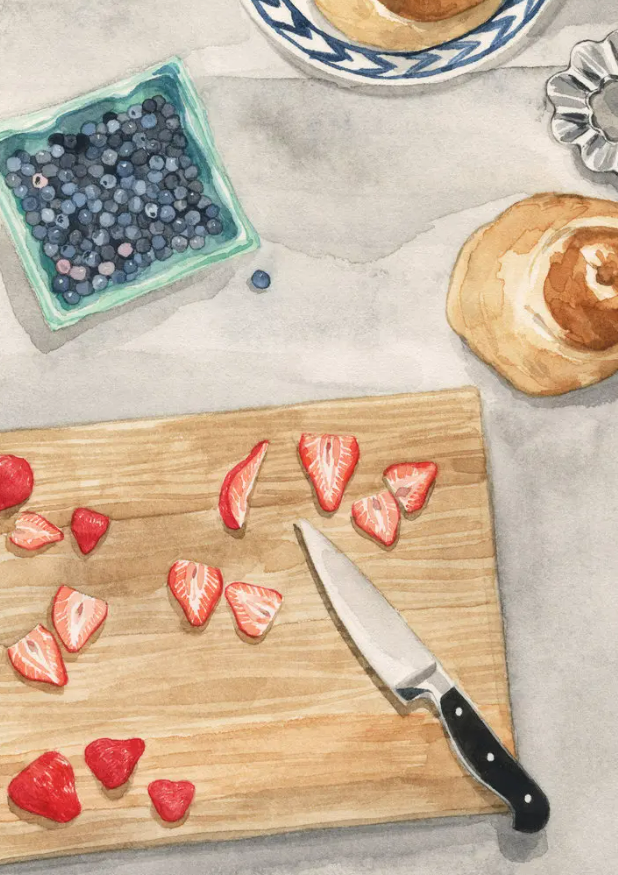by Elisabeth Stewart
age 15, College Station High School, College Station, Tex.

插图 Melinda Josie
When the phone finally stopped ringing and the house lay still with grief, I filled my home with the aroma of flaky pie crust and sweet peaches to mask the scent of worry that still lingered.
The weekend after the diagnosis, Mom had copied and pasted the same text to each concerned relative, old friend and college roommate: Jay was diagnosed with a type of early-onset dementia in April. We had an appointment with a neurologist in Houston last week. His condition is called Pick’s disease. We are going back in a few weeks for more information.
Then Mom put down the phone, rubbed her forehead, and suggested that we go for a drive.
I grabbed my newly-minted learner’s permit and started the Nissan Pathfinder we bought from our neighbors after Dad’s company confiscated his truck. On the interstate, we passed a fluttering banner with bold red letters: “Fredericksburg peaches, the best fruit you can find in Central Texas.” Mom slipped on a medical mask and went to negotiate with the vendor.
Now in our kitchen, peach juice seeped through the cardboard box onto the counter. I rinsed a ripe peach under the sink and lifted the fruit to my lips. Juice dribbled down my chin to my arm. The sweet smell diffused into the living room and pulled Dad away from the football reruns on TV.
“Oh! You got peaches?” His large stomach pressed into the counter as he eyed the fruit with childish glee.
“Here,” I handed him a green serrated knife. “We’re making peach cobbler.”
I showed him how to peel the skin off the fleshy fruit, run the blade around the seed, and loosen the peach halves to cut the juicy fruit. As I made pie dough, he asked questions: How long does it take to bake? How much sugar? Are you adding almond extract? How many peaches? What should I do with the seeds? I combined our efforts with a lattice topping over the bed of peaches, and then signaled Dad to open the oven.
Standing there at the counter, showing him how to slice and measure and mix in a calm, firm voice, I suddenly felt grown up. The summer had reversed our roles; now, I was the adult, wincing as the blade neared his fingers. Mom worked through quarantine, so I stayed home and cooked his dinner, washed his T-shirts and helped him make phone calls. When Dad asked the same question every night — “Are we eating inside or outside?” — I always gave him the same answer, unless the August heat decided to scorch the patio. I stayed up late thinking about him and anxiously monitored him like an overbearing caretaker.
That same day, long before the afternoon drive and peach cobbler, I had held my tears as I read the prognosis for Pick’s disease: four to 10 years, depending on how fast the damaged proteins overpower Dad’s brain. I decided then that I would be grateful for just four more years with Dad, enough for him to see me become an adult for real.
Once the pie crust shone golden through the tinted oven door, we gathered on the patio to eat and watch the birds. I savored the moment and the warm dessert before either of us aged further: silver spoons clinking in fiesta bowls, vanilla ice cream melting over the cobbler, both warm and cold and perfectly sweet, a memory to cherish in the coming weeks when we wouldn’t have the time for baking or long evening drives.